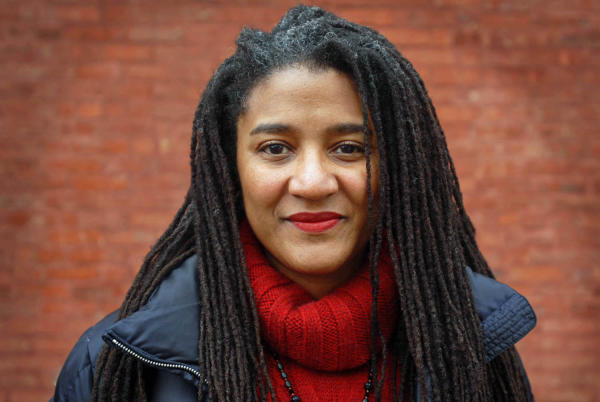Six years ago, playwright Lynn Nottage had just gotten back from Africa – where she was working on her Pulitzer Prize-winning play “Ruined” – when she received an email from her friend.
Her friend was a single mom with two children and struggling to make ends meet. She wasn’t looking for sympathy, Nottage said, her friend just wanted support.
“I had no idea she was suffering,” Nottage said of the email when she spoke in Kirby Hall on Wednesday, the first lecture of the Black Heritage Month event series from the Office of Intercultural Development. “I had no idea she was broke. It made me realize just how the majority of us in this country live no more than two to three doors away from someone who is experiencing real economic insecurities.”
A while later, Nottage marched with that same friend in Zuccotti Park during Occupy Wall Street. She said it was an inspiration.
“I had this desire to understand how economic stagnation was re-shaping the American narrative,” the 10th annual John L. Hatfield ‘67 lecturer said.
It was an inkling of an idea that would become her play “Sweat,” which tells the story of multicultural field workers whose lives are altered by the closing of the metal tubing factory.
It spans a 10-year period and focuses in particular on two young men, one who’s African-American and one who’s white, and their mothers. The play explores how the shifts in their economic fortune unravelled their once tight community, creating racial tensions and destroying friendships.
After marching with her friend, Nottage began looking for a city in which to start her investigation. Upon reading a New York Times article on the poorest cities in the country, she chose Reading, Penn.
“Reading has once been this incredible industrial powerhouse, but had become this racially and economically stratified city amidst some of the wealthiest counties in Pennsylvania,” Nottage said.
Beginning in January 2012, Nottage began regularly traveling to and from Reading for the next two and a half years, collecting stories of residents. She talked to local historians, politicians, educators, students, the homeless and recovering addicts, among others. Nottage’s idea for “Sweat” finally came, however, after speaking with a group of white, middle-aged steelworkers.
“This was a group of predominantly white men, and it was the first time I ever sat in a circle with middle-aged white men who were steelworkers…They spoke very passionately and honestly about losing their economic base and losing their identity and losing their mean to survive,” Nottage said.
When the Oregon Shakespeare Festival commissioned a production on a historical American Revolution, Nottage immediately knew what she wanted to do.
“With ‘Sweat,’ I wanted to open up a wider conversation about how economic inequality is stifling the voices of a large segment of our population and creating real riffs across economic and racial lines,” she said. “My goal was to provoke people to ask bold questions.”
Nottage ended her lecture by “making a case for art and theater” and credited Phillis Wheatley as a main inspirational figure of hers. Wheatley, an African-American and the first woman to publish a book of poetry, had to overcome vast legal struggles to accomplish her goals.
Nottage spoke of Wheatley as one who had to overcome battles of freedom that are still faced today.
“It’s why I wrote ‘Sweat,'” said Nottage, moved to tears, “and it’s why I make theater.”






















































































































CAROLE DOERR • Feb 6, 2023 at 5:16 pm
Yesterday, I saw the play Clyde’s written by Lynn Nottage and she has a beautiful gift for character development at a pace that keeps the audience thirsting for more information. She used sandwiches as a metaphor for each person ‘s desire to create something that was special with interesting ingredients. Even though they were held back, revealing their stories gave each them hope that they could climb out of the “black hole.”